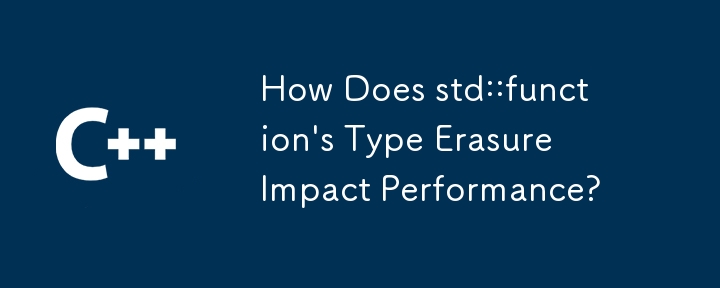

Performance Considerations with std::function
The efficiency of std::function has been a topic of discussion, especially due to concerns about potential performance drawbacks associated with its type-erasure capabilities.
Type Erasure and Associated Overhead
std::function, as a type-erasing class, enables the storage and invocation of callable objects of different types. This flexibility comes at a cost, as the type-erasure mechanism introduces additional overhead.
Internal Mechanism and Lifetime Issues
std::function does not directly embed the callable object but stores a pointer to it. This pointer may lead to dangling pointers if the callable object has a shorter lifespan than the std::function object. To address this, std::function may create a heap copy of the callable object through dynamic memory allocation.
Performance Implications
The dynamic memory allocation used in std::function can impact performance, potentially introducing a noticeable performance overhead. However, it's important to note that this overhead doesn't occur in all cases.
Mitigating Performance Penalties
Understanding the mechanisms behind std::function can help avoid unnecessary performance penalties. By ensuring that the callable object passed to std::function has a lifetime exceeding the std::function object, or by employing techniques described in the referenced article, "Efficient Use of Lambda Expressions and std::function," it's possible to minimize the performance overhead associated with std::function.
The above is the detailed content of How Does std::function's Type Erasure Impact Performance?. For more information, please follow other related articles on the PHP Chinese website!
 Is the speed of php8.0 improved?
Is the speed of php8.0 improved?
 What does ps mask mean?
What does ps mask mean?
 Velocity syntax introduction
Velocity syntax introduction
 How to restore Bluetooth headset to binaural mode
How to restore Bluetooth headset to binaural mode
 How is the performance of thinkphp?
How is the performance of thinkphp?
 what is world wide web
what is world wide web
 Win11 My Computer Added to Desktop Tutorial
Win11 My Computer Added to Desktop Tutorial
 What is the difference between hardware firewall and software firewall
What is the difference between hardware firewall and software firewall




